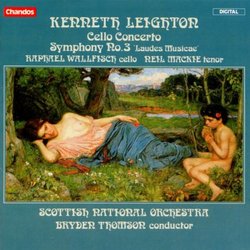| All Artists: Leighton, Thomson, Lso Title: Symphony 3 / Cello Concerto Members Wishing: 0 Total Copies: 0 Label: Chandos Release Date: 10/28/1992 Genre: Classical Styles: Forms & Genres, Concertos, Historical Periods, Modern, 20th, & 21st Century, Instruments, Strings, Symphonies Number of Discs: 1 SwapaCD Credits: 1 UPC: 095115874127 |
Search - Leighton, Thomson, Lso :: Symphony 3 / Cello Concerto
 | Leighton, Thomson, Lso Symphony 3 / Cello Concerto Genre: Classical
Leighton (1929-1988) wrote a kind of rigid neo-romanticism, very much in the tradition of the British composers of his generation, i.e. Arnold, Walton, and Finzi. Leighton's Concerto for Cello and Orchestra (1955) is a m... more » |
Larger Image |

 Track Listings (6) - Disc #1
Track Listings (6) - Disc #1